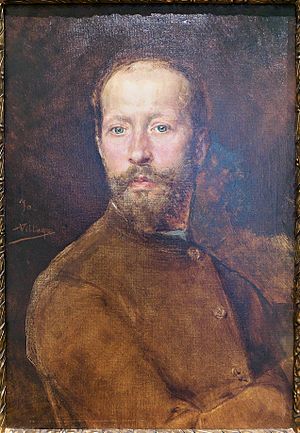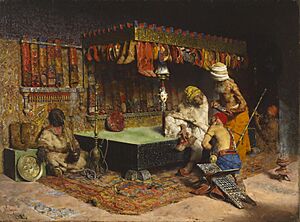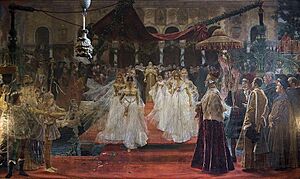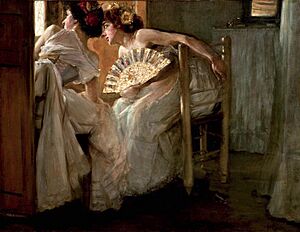José Villegas Cordero facts for kids
Quick facts for kids
José Villegas Cordero
|
|
|---|---|

Self-portrait, 1875-76
|
|
| Born | 26 August 1844 Seville, Spain
|
| Died | 9 November 1921 (aged 77) |
| Education | José María Romero López; Escuela de Bellas Artes de Sevilla |
| Movement | Costumbrismo; Orientalist |
José Villegas Cordero was a Spanish painter. He was born in Seville, Spain, on August 26, 1844. He passed away in Madrid on November 9, 1921, at the age of 77. He was known for painting historical events, scenes of everyday life, and pictures showing Spanish customs.
Contents
Early Life and Artistic Beginnings
José Villegas Cordero's father ran a barbershop. At first, his family wasn't sure about him becoming an artist. However, when he was just sixteen in 1860, he sold one of his paintings. This success changed his family's mind.
He then became a student of the painter José María Romero López for two years. After that, he joined the Escuela de Bellas Artes de Sevilla. There, he continued his art studies with Eduardo Cano.
Travels and New Styles
In 1867, José Villegas Cordero moved to Madrid. He worked in the art studios of Federico de Madrazo. While in Madrid, he spent a lot of time at the famous Museo del Prado. He copied paintings by master artists like Velázquez to improve his own skills.
He was inspired by the Orientalist painter Marià Fortuny. This led him to take a trip to Morocco. Near the end of 1868, his family helped him financially. He decided to visit Rome with some friends. In Rome, he worked in the studio of Eduardo Rosales.
It was in Rome that he started painting his first "costumbrista" works. These paintings showed local customs and everyday life, and they became very popular. He also began painting "Orientalist" scenes. These were based on the many sketches he brought back from Morocco. He even returned to Morocco briefly to gather more ideas. Paintings of these types were very popular, and his works were widely promoted.
A Flourishing Career
After 1877, José Villegas Cordero often lived in Venice, Italy. He created paintings that were popular with wealthy American art buyers. By 1887, he was able to build his own house, which he designed himself. This house soon became a popular meeting place for important people in society. He also started teaching a small number of art students.
In 1878, the Spanish Senate asked him to paint a large historical artwork. The painting was supposed to show "Hernán Cortés' meeting with Moctezuma". This project was later cancelled, but it inspired him to create many other historical paintings.
Later, a Dutch publishing company asked several famous European artists to illustrate a special Magna Biblia (a large Bible). Villegas was chosen to paint the prophecies from the Book of Isaiah.
Challenges and New Roles
The 1890s started quietly for him. However, in 1896, his younger brother Ricardo passed away unexpectedly. Ricardo was also an artist. This sad event caused José to feel very depressed. During this time, he began painting more religious-themed works.
Two years later, in 1898, he was appointed Director of the "Academia española de Bellas Artes en Roma." This was a Spanish art academy in Rome.
In 1901, he was recognized for his work at the academy. He was then named Director of the Museo del Prado in Madrid. He left his studio in Rome and returned to Madrid for this new role. He was the director of the museum until 1918. During his time there, he made many important changes to the museum's organization. He also became well-known as a portrait painter. He resigned from his position due to some negative news related to an incident at the museum.
See also
 In Spanish: José Villegas Cordero para niños
In Spanish: José Villegas Cordero para niños
- List of Orientalist artists
- Orientalism
Images for kids
 | Valerie Thomas |
 | Frederick McKinley Jones |
 | George Edward Alcorn Jr. |
 | Thomas Mensah |





